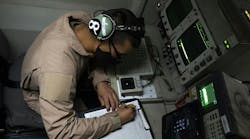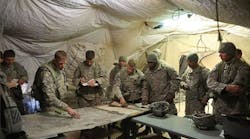By J.R. Wilson, senior editor
Military & Aerospace Electronics
One of the guiding principles of military acquisition in recent years has been to draw as heavily as possible on technology designed and developed by the commercial world, and adapt it to military applications. Sometimes, however, something develops outside the Pentagon that appears to get overlooked in its potential influence on military operations.
As U.S. forces began shipping out of the continental U.S. for points in and around the Middle East this year, one such overlooked development was the switch of American cellular telephone companies to all-digital service, and the decision of three national carriers to make that conversion to something called the "Global System for Mobile Communication," better known simply as GSM.
GSM has, in fact, been the standard in most of the world for several years. With the U.S. now joining the field, GSM service is available in nearly 200 countries and regions, covering 95 percent of the planet. That includes virtually all of Europe, Latin America, Africa, and Asia, including the Middle East — even Iraq.
Interestingly, Iraq's only recognized (and barely so) GSM carrier is a company called KurdTel, operating in the northern no-fly zone where Iraqi Kurds have established a relatively free pseudo-state unhampered by Saddam Hussein's control. A second GSM mobile service, bought from China, is reportedly being set up around Baghdad, but details about it are sketchy and it is not included in international GSM provider lists.
GSM service is easily available in Kuwait, Saudi Arabia, Turkey, Bahrain —even Uzbekistan and Afghanistan. Ironically, GSM was largely unavailable in the United States when U.S. forces began deploying to Afghanistan in 2001.
So what does all this mean to the U.S. military?
The answer is simple. A U.S. soldier can sign up for GSM mobile phone service in the United States; there are several carriers, but the three largest are AT&T, Cingular, and T-Mobile. Then the soldier can acquire a worldphone, or one that operates on all three GSM frequencies — 1900 MHz in the U.S., mostly 1800 MHz in Europe, and 900 MHz in the Middle East.
With this capability, American military personnel can place cellular calls from anywhere coverage is available. This includes, potentially, downtown Baghdad. Add another service called GPRS (General Packet Radio Service) and that same worldphone can send and receive e-mail, photos from built-in or easily attached cameras, etc.
Now think about this worst-case scenario: a soldier in a firefight, frightened and thinking of family, calls home, even sends a live picture of the battle. Then suppose the same soldier is captured and the interrogator is delighted to find the cell phone also contains a full-function PDA and contains just about anything he might want to know about the prisoner. This scenario does not even consider the ability of the captor to send the soldier's mother, wife, or husband a live picture of said POW, post-interrogation.
What is odd here is the brass didn't seem fully aware of all this, even as they turned the same and similar (satellite-based phones) technology against al-Qaida while seeking, through the Transformational Communications Office, to establish a broad, interactive and easily used global military communications network. As a result, no policy regarding PDA worldphones was in place (although inquiries regarding same may have spurred the development of one).
Headquarters Army, Navy, Air Force, Central Command, Office of the Secretary of Defense — the general response, after a moment's pause, pretty much echoed this from Air Force Headquarters: "There is no official policy. It is based on force protection issues at the discretion of the local commander. That is, of course, subject to change, based on current events."
A representative of each service also pointed to service-provided e-mail available to all U.S. military personnel, at home and deployed, even on submarines at sea.
As Cryptologic Technician-Communications, 2nd Class, Brendal Pennington of the USS Bataan (LHD 5) put it, "I believe having e-mail access at sea is the single-most important morale booster a ship can have. If e-mail is down for just one day, you can notice a significant change in everyone's demeanor."
Thus the e-mail, instant messaging, and even commercial Internet access capabilities of Army Knowledge Online, which the Army describes as a key element in its strategy to transform into a network-centric, knowledge-based force. It also is the primary, Army-approved method for soldiers and their families to keep in touch (although old-fashioned pen-and-paper letters and cards also remain a part of 21st Century mail call).
Air Force officers, who are subject to official demands and the local commander's discretion, also make Air Force computer networks available to their members for such purposes. As does the Navy through the Navy/Marine Corps Intranet (mostly in the continental U.S.) and the at-sea elements of its "Information Technology for the 21st Century" (IT21) networking initiative.
Members of all services can also use Global Internet (GI) mail, developed for the Air Force Air Mobility Command, but converted to commercial Internet service availability in 2000.
The long-term intent is for everyone in the military to receive one e-mail address — with no reference to rank or station — that will follow that person from enlistment to discharge or retirement and, presumably, will be able to receive e-mail from any source to wherever the individual is at any given moment, without the sender necessarily knowing that location.
Plans to extend that availability to the combat ensemble, beginning with Land Warrior in mid-decade, were dropped over security concerns that now have overtaken military development from the civil side.
Given all that has been happening in the past two years, perhaps it is not unexpected that military decision-makers failed to note the real meaning of all those TV commercials, such as the one showing someone taking a cell phone picture of Little Richard in a bowling alley. Or, since no previous U.S. cell phones — and many new ones — were capable of operation outside the United States, perhaps the new expansion of worldphone service fell under the radar.
What else has slipped past them, wonders the mother of a National Guardsman who was recently called up for duty in the Gulf. A concern worthy of a mother, but one that touches on a wider question: Is a military — not just in the U.S. but worldwide — forced to rely so heavily on commercial technological development taking proper care to monitor and assess the impact of rapidly evolving, purely commercial technologies on its own operations?
Old jokes and stories about soldiers in Grenada using credit cards to call the Pentagon long distance to get messages to Navy ships offshore, and soldiers in the Gulf War deploying with GPS navigators bought at Radio Shack by their concerned mothers now seem to have found yet another chapter.
The question is, are these stories truly the fodder of late night TV hosts' monologues or are they a serious issue still not fully realized 20 years after Grenada?
Leaving the decision on PDA worldphones to local commanders or the "good common sense" of military personnel, as one contact put it, may be sufficient in the vast majority of cases, but misuse or abuse by only a few, with no ill intent, could prove catastrophic.
For now, the best that can be said comes from the office of the Army Chief of Information (CIO)/G-6: "Army Information Assurance officials have reviewed the policy documents. So far, the only thing close is that commanders should not allow privately owned equipment into the field. We have policies restricting the use of private cell phones and PDAs from secure areas. Army IA officials are considering publishing a policy letter specifically addressing phones with cameras, microphones and e-mail capabilities and to prohibit them completely."
In the future, however, perhaps someone also should be assigned to watch Little Richard's TV commercials.


